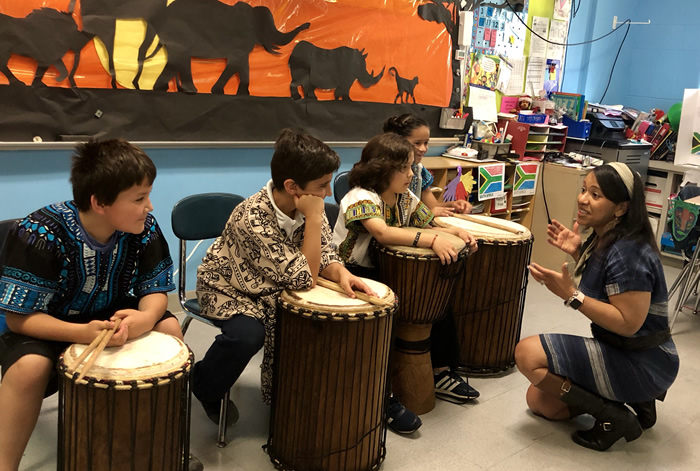
Teaching vocal performance in the music theatre program, Melissa Foster (BSM96, GBSM01) is well aware of the power and potential of controlled breathing. And with a new research partnership through the Buffet Institute for Global Affairs, she will apply her expertise to a six-year grant addressing trauma endured by children during the COVID-19 pandemic.
Trauma, Music, and the Breath is an interdisciplinary assemblage of 11 artists and scholars across the University and the arts that will develop evidence-based music interventions for children ages 5 through 11. Schools and community centers will be able to use singing, rhythm, and breath as tools for mitigating or reversing the damage caused by the prolonged isolation and developmental disruptions of the pandemic.
“Everyone brings something very different to the team,” Foster says. “Only a cohort as cohesive as this could actually work on a topic that is this multifaceted and rigorous.”
Featuring experts in neuroscience, psychology, ethnomusicology, and performance (Professor Nina Kraus, a researcher in auditory learning, is a contributor), the team will travel internationally to collect data and create sustainable programs that can help children and families over the course of years.

“It’s invigorating but also daunting to figure out the systems that can help trauma in an ongoing fashion,” Foster says. “What we don’t want to do is arrive at a place, guide activities, and then leave. That’s not a system; that’s not repeatable. We have to develop something that can happen without our presence, while simultaneously attacking the problem immediately.”
The pandemic’s complicated reality is that this destructive, isolating force brought some unexpected gifts. For Foster, the Buffet initiative was one such opportunity. Another was the bandwidth to devote to a new and entirely different research project.
“COVID-19, George Floyd, and Black Lives Matter sparked personal reflection regarding what was truly important to me and how I could contribute in a way that matters to my community,” she says. “Presenting through historical analysis the theory that hip-hop is responsible for what a lot of contemporary music theatre sounds like, along with offering a deep dive into performance techniques that allow for authenticity, will I hope contribute to the necessary shift from appropriation to appreciation.”
The Buffet project is about trauma and music, but she says the hip-hop community’s lack of theatrical recognition is also about trauma and music. “They intersect in a way that makes me incredibly grateful to be doing this work,” she says.
Foster’s book A Performer’s Guide to Hip-Hop, R&B, and Rap: History, Influence, and Vocal Techniques is due out in 2022. Her work with Buffet kicks off this fall with the aim of creating an institute dedicated to the interdisciplinary study of music, health, and well-being.
